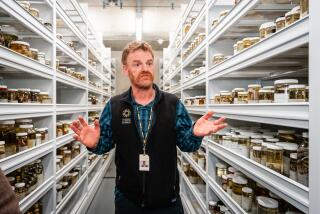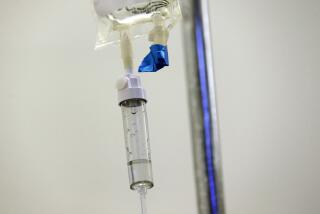Science / Medicine : ON MEDICINE ROBERT STEINBROOK : New Drug Is a Potential Lifesaver--but Unavailable
- Share via
In recent years, the federal government has often speeded drugs for AIDS and other life-threatening diseases to the seriously ill. Thousands of AIDS patients are now treated with experimental medications such as DDI and DDC, although formal testing is still in progress.
Against this backdrop, one might have expected that federal officials would expedite access to a promising treatment for blood poisoning, which has the potential to save the lives of tens of thousands of Americans each year.
But the medication, a genetically engineered antibody called HA-1A, remains unavailable to almost all patients who might benefit from it.
The case offers a window onto the current drug approval process. Despite a federal commitment to speed things up, the testing and approval of new medications often drags on for years.
One factor is the lengthy drug review process at the U.S. Food and Drug Administration. Another is a decision by two drug manufacturers not to push for the wider availability of their products in advance of final FDA action.
In addition, unlike the situation with AIDS, there are no powerful physician or patient activist groups prodding the FDA and the drug companies out of a business-as-usual posture.
Severe cases of bloodstream infection result in shock, which prevents blood from circulating to vital organs. About 400,000 cases of bloodstream infections occur in the United States each year.
The effectiveness of HA-1A was demonstrated in a study of hundreds of patients published last month in the New England Journal of Medicine. Patients who received a single intravenous dose of the antibody in addition to antibiotics and intensive care had a 30% death rate within 28 days, compared to a 49% death rate for the patients who did not receive the drug. No serious side-effects of the antibody were noted.
But the results of the study, which was completed in 1989, were old news to FDA officials and the antibody’s manufacturer, Centocor Inc. of Malvern, Pa.
The FDA is still reviewing a September, 1989, marketing application submitted by Centocor, which was based in large part on the results of the study. It is also reviewing a December, 1988, application for a related medication from Xoma Corp. of Berkeley.
Citing what they view as confidentiality requirements, FDA officials declined to discuss why their review of Centocor’s data has already taken 18 months.
One possibility is that the FDA officials question the validity of the study results and are scrutinizing the actual laboratory data. If this is the case, they should explain this publicly.
Such an explanation could allay fears that federal inefficiency is delaying access to a potentially lifesaving medication. It would also allow researchers to immediately begin new studies that could address the FDA’s concerns.
Another possible reason for the delay centers on the cost to drug manufacturers of allowing wider use of their products before final marketing approval. Neither Centocor nor Xoma has pressed the FDA for expanded access, as is often done with highly promising AIDS drugs. Centocor has supplied HA-1A to a small number of patients on “a compassionate-use basis” and sent a supply to U.S. military physicians in the Persian Gulf.
Centocor won’t say so, but it may have been deterred from following the example of some AIDS drug manufacturers by the high cost of making the antibody. A single dose of HA-1A is likely to cost several thousand dollars, making it one of the most expensive of all medicines. When promising drugs are made available before testing is completed, patients usually are not charged.






